Early tissu - Study guides, Class notes & Summaries
Looking for the best study guides, study notes and summaries about Early tissu? On this page you'll find 9 study documents about Early tissu.
All 9 results
Sort by
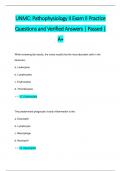
-
UNMC: Pathophysiology II Exam II Practice Questions and Verified Answers | Passed | A+
- Exam (elaborations) • 10 pages • 2024
- Available in package deal
-
- $10.09
- + learn more
While reviewing lab results, the nurse recalls that the most abundant cells in the blood are: a. Leukocytes b. Lymphocytes c. Erythrocytes d. Thrombocytes : C. Erythrocytes The predominant phagocyte of early inflammation is the: a. Eosinophil b. Lymphocyte c. Macrophage d. Neutrophil : D. Neutrophils 2 A 35-year-old male has enlarged lymph nodes in the neck and a mediastinal mass. He was diagnosed with Hodgkin's lymphoma. Which of the following abnormal cells would the nurse...
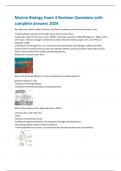
-
Marine Biology Exam 4 Revision Questions with complete answers 2024
- Exam (elaborations) • 8 pages • 2024
-
- $7.99
- + learn more
Describe how a black smoker functions, the flow of seawater, and how the chimney is built. 1) Cold seawater seeps down through cracks into the ocean floor 2) Seawater seep into the ocean crust. Molten rock heats up water to 350-400 degrees C. Water reacts with rocks, removes all oxygen and becomes acidic. Dissolves metals (copper, Iron, zinc) Picks up hydrogen sulfide. 3) Hot fluids rise through the crust. Carries the dissolved metals and Hydrogen sulfide with them. 4) Fluid exit the chi...
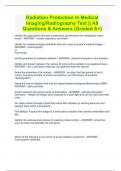
-
Radiation Protection in Medical Imaging/Radiography Test || All Questions & Answers (Graded A+)
- Exam (elaborations) • 8 pages • 2024
-
Available in package deal
-
- $9.00
- + learn more
Radiation Protection in Medical Imaging/Radiography Test || All Questions & Answers (Graded A+) Radiation Protection in Medical Imaging/Radiography Test || All Questions & Answers (Graded A+) Identify the organization that sets construction specifications for radiography exam rooms - ANSWER - nuclear regulatory commision identify the medical imaging modalities that use x‐rays to produce medical images. - ANSWER - mammograph ct fluoroscopy list the properties of scattered radiation...
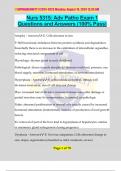
-
Nurs 5315: Adv Patho Exam 1 Questions and Answers (100% Pass)Nurs 5315: Adv Patho Exam 1 Questions and Answers (100% Pass) Atrophy - Answer️️ -E. Cells decrease in size P. Still functional; imbalance between protein synthesis and degradation. Essentially
- Exam (elaborations) • 78 pages • 2024
- Available in package deal
-
- $13.49
- + learn more
Nurs 5315: Adv Patho Exam 1 Questions and Answers (100% Pass) Atrophy - Answer️️ -E. Cells decrease in size P. Still functional; imbalance between protein synthesis and degradation. Essentially there is an increase in the catabolism of intracellular organelles, reducing structural components of cell Physiologic: thymus gland in early childhood Pathological: disuse (muscle atrophy d/ decrease workload, pressure, use, blood supply, nutrition, hormonal stimulation, or nervous stimulatio...
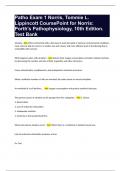
-
Patho Exam 1 Norris, Tommie L. Lippincott CoursePoint for Norris Porth's Pathophysiology, 10th Test Bank
- Exam (elaborations) • 58 pages • 2024
- Available in package deal
-
- $13.49
- + learn more
Patho Exam 1 Norris, Tommie L. Lippincott CoursePoint for Norris: Porth's Pathophysiology, 10th Edition. Test Bank Atrophy - Ans: When confronted with a decrease in work demands or adverse environmental conditions, most cells are able to revert to a smaller size and a lower and more efficient level of functioning that is compatible with survival. What happens when cells atrophy? - Ans: Reduce their oxygen consumption and other cellular functions by decreasing the number and size of their ...
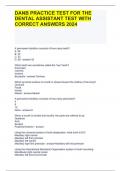
-
DANB PRACTICE TEST FOR THE DENTAL ASSISTANT TEST WITH CORRECT ANSWERS 2024.
- Exam (elaborations) • 64 pages • 2024
-
- $7.99
- + learn more
A permanent dentition consists of how many teeth? A. 28 B. 30 C. 32 D. 26 - answer-32 Which teeth are sometimes called the "eye" teeth? Premolars Canines Incisors Bicuspids - answer-Canines Which proximal surface of a tooth is closest toward the midline of the body? Occlusal Facial Incisal Mesial - answer-Mesial A permanent dentition consists of how many premolars? 4 8 12 None - answer-8 When a mouth is divided into fourths, the parts are referred to as: Quadrant...
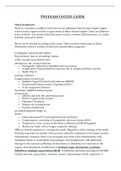
-
PN3 EXAM 3 STUDY GUIDE
- Exam (elaborations) • 35 pages • 2022
-
Available in package deal
-
- $13.00
- + learn more
PN3 EXAM 3 STUDY GUIDE Shock Syndromes: Shock is a systemic condition where there is an imbalance between the oxygen supply to the tissues/organs and the oxygen needs of those tissues/organs. There are different types of shock. Any situation that decreases vascular volume, blood pressure, or cardiac function can lead to shock. Shock can be divided according to the cause. There are three main types of shock. Distributive shock is further divided into another three categories. Cardiogenic:...
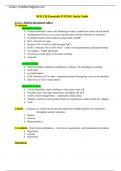
-
NUR 120 Essentials II FINAL Study Guide
- Exam (elaborations) • 30 pages • 2023
-
- $13.49
- + learn more
NUR 120 Essentials II FINAL Study Guide w1-w5 – Fluid & Electrolytes/ ABG’s IV solutions Hypertonic solution Greater osmolality causes cell shrinking as water is pulled out of the cell into blood. Administered slowly or can cause intravascular overload. Monitor for overload. Carefully monitor serum sodium, lung sounds, and BP. D10 – dextrose in water Dextrose 5% in 0.45% or half strength NaCl. D5NS - Dextrose 5% in 0.9% NaCl – used to treat hyponatremia and hypovo...
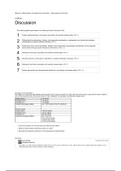
-
NR507 Week 5: Alterations in Endocrine Function - Discussion Part One
- Other • 19 pages • 2021
-
- $13.49
- + learn more
NR507 Week 5: Alterations in Endocrine Function - Discussion Part One Ms. Blake is an older adult with diabetes and has been too ill to get out of bed for 2 days. She has had a severe cough and has been unable to eat or drink during this time. She has a history of Type I diabetes. On admission her laboratory values show: Sodium (Na+) 156 mEq/L Potassium (K+) 4.0 mEq/L Chloride (Cl–) 115 mEq/L Arterial blood gases (ABGs) pH- 7.30; Pco2-40; Po2-70; HCO3-20 Normal values Sodium (Na+) 136-...

How did he do that? By selling his study resources on Stuvia. Try it yourself! Discover all about earning on Stuvia


